- Home
- Belva Plain
Secrecy Page 2
Secrecy Read online
Page 2
“Where do you go?” he asked carelessly.
“The Lakewood School.”
“Oh. All girls.”
“Yes,” she said.
He turned away to the man on his other side, who had begun a conversation about football. Naturally, that would be more interesting for him than anything Charlotte was able to talk about. Still, if she were beautiful, if she knew how to “mingle,” as Elena had said, it might, in spite of her youth, be different.
So she sat silently, watching and listening as before. It was interesting how if you watched and listened carefully, things meant to be hidden became clear. You could tell when two people who were very polite to each other did not like each other.
“A wedding trip to Italy,” Elena said in her bright voice. “How wonderful. You’ll love it. I sometimes wonder how I ever could have left.”
“I should imagine you left for your husband’s sake,” said a woman whom Charlotte recognized as the mother of one of the popular girls. Her mouth smiled at Elena while she reproved her.
Elena knew it too. Her shrug said: Your opinions make no difference to me. And she returned to her little flirtation with the man next to her.
Why was Dad not noticing? Perhaps he was but had too many other things to think about.
“After eighty years we have to close the plant,” Uncle Cliff was remarking to someone. “And let me tell you, we feel the pain. But textiles are moving south, or else to Asia. You know what’s happening.”
Dad worried. When he caught Charlotte’s glance, he smiled. But he worried.
Many things troubled Bill, even in the middle of a wedding feast. He wondered whether Charlotte had heard them quarreling last night. But even if she had not, she knew too much. You can’t hide things when you’re living next to each other in the same house. Even when you keep a surface calm, the current is felt, the undercurrent is palpable. How we suffer, some of us, and how our children suffer because of us!
His glance touched on Ted and moved to Claudia. Yes, he thought, regardless of her joy today, there is a shadow on her face. Ted is a problem for her. She may not even know it. She may not yet see, or perhaps never will see plainly, what I saw the first time I met him: the contemptuous swing of his walk, the sullen mouth, the narrow eyes, fast-shifting, never looking straight at your eyes. He is a fox. He can be cruel.
And then he thought: This is absurd. What am I, a mind-reader? It’s only my mood that makes up such morbid fictions.… Elena and I will part. In spite of my best efforts, and I shall make them, it will happen, though I don’t know when. And it will be so hard for Charlotte, my little Charlotte.
On the way home Bill remarked cheerfully, “It was a nice wedding, small and intimate. And I really do like Claudia.”
“Yes, it was very pretty,” Elena said. “If only Claudia knew how to dress!”
No one replied. The comment left an unpleasant sense of gloom, quite out of proportion to its importance.
After a while Bill said, “She’s had to struggle for a living. I don’t imagine she’s had the time or the means to fuss much about clothes. Oh, look over there on the left—must be a dozen bluejays on that limb. I guess they plan to stay all winter.”
Charlotte was familiar with this effort to keep a genial mood alive. Sometimes the effort seemed almost ridiculous, since it seldom worked. Elena laid her head back on the seat; her plump, glossy curls rested on her upturned collar; she had never ceased her animated talk all through the day, but now she was silent.
And soundlessly, Charlotte implored: Say something, answer him. Inside, near her stomach, or perhaps actually within her stomach, things quivered.
Bill cried out, “Do I see snowflakes?”
The day had started out mild, but while they had been indoors, the sky had gone gray and cold. Hard, Charlotte thought, like an iron lid.
“They’ve been predicting an early winter,” Bill resumed, “and I think I’ve noticed squirrels doing more scurrying for food than usual. Have you noticed, Charlotte?”
“No, but I’ll watch out tomorrow.”
“How I dread the winter.” Elena sighed. “This miserable climate. Just getting out of bed in the morning—my flesh shrinks to think of it. Where are you going, Bill? I thought we were going straight home.”
“I want to take a look at the plant first.”
“What on earth for?”
“Sentimental reasons, I suppose.”
From where the car stopped on the opposite bank of the river, the old Dawes Textile Building looked as if it had been long abandoned, although it had only been closed for the last two months. Already it was a relic, Bill thought ruefully, one of a string of old industries on countless East Coast rivers that the century had passed by. Of its many small-paned, old-fashioned windows a good number, tempting targets for stone-throwing boys, were already smashed. Soon rain and snow would rot the interior. Birds and rats would nest unless—unless a buyer should come along and rescue it. But there was a singular dearth of buyers for a place like this one, three floors high, eighty years old, four acres square with another thirty acres, mostly swampland, behind it. In front of it the river rolled toward the distant ocean. There was no sign of life in any direction. For a few moments they all sat staring into the faded afternoon.
Suddenly Elena said, “No one’s ever going to buy this thing. Kingsley is a decaying town. In fact, it’s decayed already. No one’s built anything here since 1890 except for the mall out on the highway.”
Bill corrected her. “That’s not quite true.”
“Well, you should have sold out five years ago to the conglomerate. Now you’re stuck with it.”
“You know very well why we didn’t. We held on, tried to keep going to save our people’s jobs.”
“So now they’re unemployed anyway. You’re too soft, Bill. You always have been. A rugged six feet four, and soft inside. My God, when I remember the fuss you made about Mrs. Boland! And she survived, didn’t she?”
He did not say that she had survived because Cliff and he had given her a nest egg large enough for her to live on the interest it paid. Instead, he said, “Mrs. B. was my father’s secretary before she was mine. She was an old widow with an older widowed mother in a wheelchair, for God’s sake. Of course we ‘made a fuss,’ as you call it.” And then, giving way unwillingly to his impatience, he added, “Claudia would understand. She’s been there herself.”
“Oh, Claudia,” Elena mocked.
Something broke in Charlotte. “Why don’t you stop?” she cried. “You’ve been fighting over this business ever since I was in fifth grade.”
Bill said instantly, “You’re right. How about dropping the subject, going home, and getting something to eat? It’s been a long time since lunch. We’ll light a fire and maybe toast some marshmallows.”
“That’ll be nice,” Elena agreed. She turned around and smiled at Charlotte. “People said lovely things about you, darling. About how smart you are in school and what a pleasant girl you are. I was really proud.”
It was dark when they reached home. Darkness in the fall felt different from the summer dark, which, gauzy and shot through with skylight, invited you to stay outside in it. Now it was thick and heavy here, pressing against the black windows as if it were trying to get in. Charlotte spread out her hands before the fire, not because she was cold, but because it was friendly.
She had been eating her way through sandwiches, apples, and marshmallows, when Elena exclaimed, “Where do you put all that food?”
“In my stomach,” she answered.
“I can’t believe it,” Elena still exclaimed, although she often described herself as one who never gained an ounce and could afford to be greedy.
“Charlotte is growing,” Bill said, putting a stop to the subject.
After that they talked, the two parents, quietly and sensibly as people should. Charlotte, reading a magazine, had no interest in what they were saying. It was just good that they were being nice together. M
aybe this niceness would last for a long time, for two or three weeks, as it often did. Only once did she come to attention, when Elena said something about Florida and was stopped by Dad’s look of warning: Not now. Not in front of Charlotte, it meant.
So the quiet talk resumed. Maybe, then, everything would be all right? And her butterflies would stop flickering? Or maybe she should simply get used to the way things were and not always be so scared that something was going to happen.
Cliff and Claudia were also having a tray before their fire, eating leftovers and drinking wine. The guests were gone, the caterers had made everything tidy again, and Ted had gone out with friends, leaving the newlywed couple alone in their home. Their relationship now, after two years, was at last official under one roof.
“I can’t believe it’s over,” Claudia said.
“It’s just beginning. We have to make an early start for the Boston airport tomorrow. Then, Rome, here we come.”
Claudia laid her hand over Cliff’s. “I almost hate to leave this house. You can’t know how thrilled I am. You and this wonderful house—I’m in paradise.”
“It’s funny,” he said, “I’ve lived all my life here, and although I know it’s a pretty big place, I never felt that it was too big until you came along. I used to fill it up with business guests, or visiting relatives, and was glad to have the space. But after the day I walked into that bookstore and got to know you, this house became as empty as a strange hotel.” He raised her hand and kissed it. “I’d never realized I was lonesome.”
“Thirty-eight years and never married—”
He laughed. “Until I found the irresistible woman.” And then, becoming suddenly grave, he said, “I want all your worries to be over. Now that you’re rid of the store, I want you to stay home here and relax. Do nothing.”
“I can’t imagine ‘doing nothing,’ Cliff.”
“You’ve got that little heart problem—”
“For which exercise and work are the best medicines.”
“Well, cook some good meals, do some volunteering, and that’s work enough. I order you.”
She was not used to being cared for this way, and she felt a kind of astonishment that these things should be happening to her. “It’s the first time—” She broke off. “This is so wonderful for Ted too. I hope you’ll like him, Cliff, now that you’ll be getting to know him. He’s not easy to know, maybe because of not having had a father since he was four. A boy needs a father, even at eighteen.” She heard herself being apologetic, yet could not help it. “Today must have been a difficult one for him. I’m sure he felt uncomfortable, although he didn’t say so. He’s rather silent, anyway.”
“Think nothing of it. As to being silent, I’m used to that. In case you haven’t noticed, I’m the talkative one in my small family. Bill’s the silent thinker.”
“I like Bill. You can feel how solid he is. Dependable.”
“And what do you think of her?”
“She’s rather charming,” Claudia responded. It behooved a new wife to be uncritical.
“Yes, but not my type.”
“Is she Bill’s type, do you think?”
“Honey, you’re asking because you can see she isn’t. She’s a little flirt—a harmless one, I think. I hope.”
“But he loves her?”
Cliff shrugged. “I told you, he’s my silent brother. He certainly wouldn’t tell me if he didn’t love her.”
“It’s possible he doesn’t know whether he does or not.”
“You’re pretty sharp, Mrs. Dawes. But what makes you say that?”
“The few times I’ve been with them, I’ve felt that he was trying somehow to please her and that they just weren’t comfortable together.”
“Not like you and me.”
“No, not at all like you and me.” She had a long vision of evenings being comfortable together in this room, or under the trees on summer afternoons.
“The person who’ll suffer from their discomfort will be Charlotte, naturally. She’s a lovely child and she deserves better. I’m very fond of her.” He paused. “Elena’s going to Florida for a couple of months.”
“Alone? That’s odd, isn’t it?”
“Well, I think so. But maybe it isn’t.”
She saw that Cliff was troubled, and that the subject ought to be dropped. “Let’s go up,” she said. “It’s getting late.”
Rob and Roy, as if they had understood, followed them up the stairs and started down the hall.
“Not that way,” Cliff signaled. “That’s Ted’s room now, not mine. They’ll sleep in the corner of our room. Here we are. All done over for you. Do you like it?”
The wide old bed was covered with a puffed quilt padded in sea-green and rose. The walls were painted in the same sea-green. A mound of shell-pink roses in an emerald bowl stood on a bedside table. And the air was fragrant. It was a room perfected for love, for sleeping side by side and for waking together on a new morning.
“Elena did the decorating. She left the walls bare because she knew you love paintings and you’ll want to choose them for yourself.”
“It’s wonderful, Cliff. The color of the sea, like a grotto. I’ve never seen one, but I think it must be like this.”
“You’ll see a famous one in Capri. Now tell me, do you want to pretend you’re a shy virgin bride and get undressed in the bathroom? Or shall I—”
“You shall. You shall right now.”
No, she was hardly a shy virgin bride. Were there such anymore? Nevertheless, she had bought for this night the laciest lace that any virginal bride could want. What a pity, she thought, laughing at herself, that I’ll not even get to put it on.
THREE
“Your father really could have come down this week,” Elena said, applying sunblock to her nose.
“He couldn’t. Some people were in town again to look at the plant and maybe buy it.”
“Nobody’s ever going to buy it. They might as well dynamite the place.”
“That’s silly.”
“Well, of course it is. Dynamiting, I mean. But give up—give it to the town or something. Oh, well, come on in for a swim.”
“I can’t. I’m supposed to finish this whole book over vacation, and I’m going home the day after tomorrow.”
“You haven’t looked at it for the last ten minutes. What on earth have you been dreaming about?”
“I’m not dreaming.”
“Gazing, then.”
Elena wanted people to be as alert and busy as she was, even if busyness meant only applying makeup or talking on the telephone. You weren’t supposed to sit and do nothing.
Charlotte answered patiently, her patience masking impatience, “I was looking at that boat.”
“What about it? They’re waiting their chance to slide into the lagoon.”
“I was thinking how sinister it seems. It has a shark’s pointed nose. And the cabin windows up front are like shark’s eyes. I think maybe they run guns or drugs in it.”
“You’re a funny girl,” Elena said. “Funny and lovable.”
She sprang up. Other people seemed to struggle up from a beach chair, whereas she got onto her feet in one easy movement. Now she stretched out her arms as if to limber herself and yawned.
“This sun makes me sleepy. Okay, I’ll be back soon.”
Charlotte watched her. Other people watched her, too, for Elena was wearing a black string bikini and a red straw cartwheel hat, which she would leave at the water’s edge. She had no objections to a tanned body, but always protected her face. No matter what Charlotte ever thought of her mother, even in those moments when she was filled with love for her, there was always a painful awareness of her mother’s difference. And this went along with her own embarrassment over it. She certainly knew that teenagers like herself are often embarrassed by their parents. So was this normal of her or not? Her mind was always divided. A mother should just be there, the way one’s bed is there, or one’s shoes on the closet floor;
you didn’t have to think about them, did you?
Elena had already joined a group going into the water, or probably it was they who had joined her. Did she know everybody on this beach, and in the condominium, too, when they all sat around the pool in the late afternoon? It certainly seemed that way. The group was laughing now. Charlotte could even hear one man’s loud whoop. Elena must have said something funny.
Actually, the week had been a success so far. All Charlotte’s previous vacations had been in western or northern places, and this was the first time she had seen palm trees, the first time she had seen water as blue as this intense, vast blue. Elena had made friends with a family who were cruising on their own boat and had taken them out on it for a day. Yesterday they had been invited to somebody’s enormous house for lunch; it had enormous lawns and white marble floors. Charlotte thought the house was too large and chilly to feel like anybody’s home. But there had been two girls of her age there, and it had turned out to be a rather good day.
There was only one thing wrong with any of the days this week. That thing was Judd. He was always there.
Yet he might be a perfectly nice person, she argued now, and he probably was. It was indecent to dislike someone who had given you no reason. He was a friendly young man, very neat, and he had a beautiful convertible in which he drove them anywhere they wanted to go. Obviously, he liked Elena, and she was jolly with him. But that was hardly any reason to mind his presence; Elena was always especially jolly with men. She was candid about liking men. She always said, even to Dad, that men were easier to get along with. Well, maybe they are, Charlotte thought now. I haven’t had experience, that’s for sure.
“Look what’s happened to the sky,” Elena said, wrapping herself in a scarlet cover-up that matched the hat. “We’re in for rain. It happens down here with no more than ten seconds’ warning.”
Clouds, massing and rolling, had turned the sky into a dull gray-brown ceiling. The day had gone sultry and heavy with heat.
“Let’s go in. Judd’s going to pick us up for lunch.”
“Does he have to come along?” asked Charlotte. She hadn’t intended to whine, yet the question came out that way.

 The Golden Cup
The Golden Cup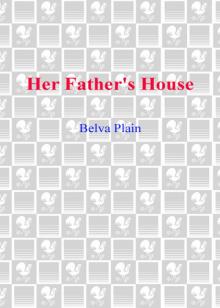 Her Father's House
Her Father's House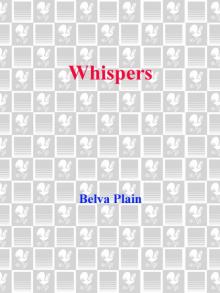 Whispers
Whispers Crescent City
Crescent City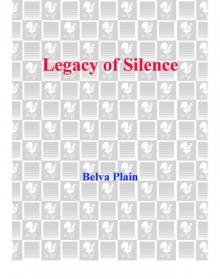 Legacy of Silence
Legacy of Silence Crossroads
Crossroads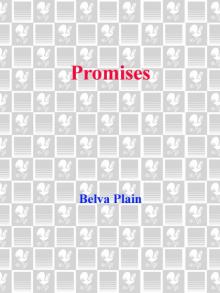 Promises
Promises After the Fire
After the Fire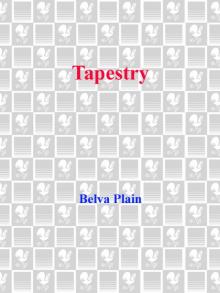 Tapestry
Tapestry Looking Back
Looking Back Heartwood
Heartwood The Carousel
The Carousel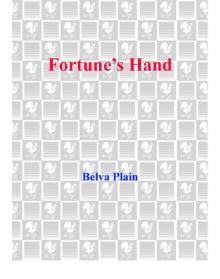 Fortune's Hand
Fortune's Hand Homecoming
Homecoming Random Winds
Random Winds Harvest
Harvest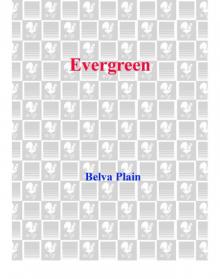 Evergreen
Evergreen Treasures
Treasures The Sight of the Stars
The Sight of the Stars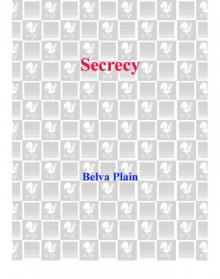 Secrecy
Secrecy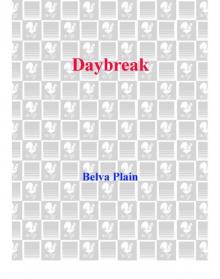 Daybreak
Daybreak Eden Burning
Eden Burning